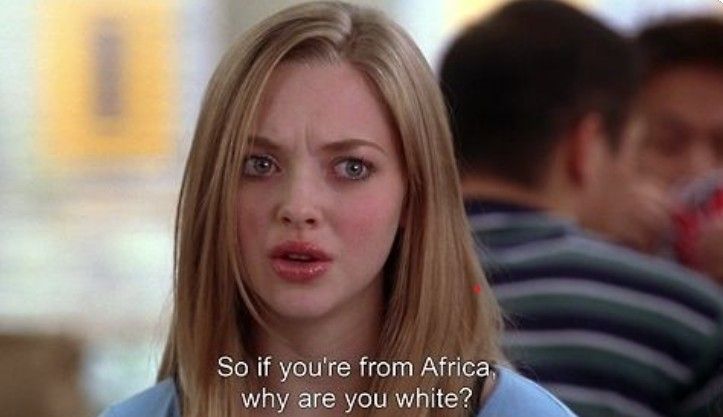If You're From America, Why Are You Asian?
“Where Are You From?”
Disclaimer: I am not an expert in DEI, Asian Studies, or other related subjects. This is the perspective from my lived experience as a Filipina American. This post is to raise awareness of the cultural differences I’ve faced, and to allow space to feel and learn.
As an English Language and Culture Assistant in Spain, people expect me to look a certain way, and that “certain way” is white. Here is an example of the cliché conversation I have had my entire life in America which has also followed me across the world:
“Where are you from?”
“I’m from Seattle.”
“I mean where are you really from?”
“I’m really from a suburb 30 minutes south of Seattle.”
“No, but where did your family come from?”
“My parents moved to Seattle from San Francisco.”
I know what they’re trying to find out, but my responses simply answer the question they’re asking. I just wish they could ask the true question they’re wanting to know: “What is your ethnicity?”
This conversation never lasts as long when white people are asked the same question (cue the classic YouTube short “Where are you From?” for a lighthearted comedic take on how the conversation would go if the roles were reversed).
The US has been labeled a melting pot for its cultural diversity. However, people believe a pure American exists and their physical features should be white passing – lighter hair, lighter eyes, lighter skin.
Overall, my experience as a Filipina American in Spain has been fine. I’m thankful for the privilege of not feeling in danger, but there have been moments of feeling singled out and not belonging.
Filipinos: “The Hispanics of Asia”
Because my legal name has Spanish roots, people are confused why my name is Hispanic but I look Asian. Unless they have prior knowledge of Spain’s history with the Philippines, it is more challenging to determine my Filipino roots. Here’s a brief overview of the ties between the two countries.
Madrid’s population in 2025 is currently estimated to be over 6.8 million people with nearly 84% consisting of Spaniards and 16% consisting of immigrants according to World Population Review.
In the year prior, La Comunidad de Madrid reported Filipinos accounted for nearly 16% of the total Asian immigration rate, mainly explained by Spain’s colonization of the Philippines from 1565 to 1898. I encourage you to research this history more if you aren’t already aware.
Fitting in as an Asian American
I’m used to being asked where I’m from whenever traveling abroad so I mentally prepared for this to happen in Spain too. However, the microaggressions can still sting no matter how much you prepare.
Some of the examples that have stuck with me since living in Spain:
- Kids pointing at me and saying “China!” as they pass in the hallway
- People (both kids and adults) pulling their eyes back to slant their eyes: I have seen this happen more in the past 9 months than I have since I was a kid
- Overhearing the teachers say to each other in Spanish, “F**k, do we need to learn Chinese with this new English assistant?” (Note: this story isn’t mine, but happened to a friend and has resonated with me)
- Having conversations with Spanish people who have insisted the Philippines is still a province of Spain and not a former colony
- By the way, may I interest you in Filipinos? They’re sold in almost every convenience store here.

All of these are reminders that people view me as different, and when I’m grouped into a general description of “China”, this disregards the uniqueness of the various ethnicities that exist in Asia.
If I was “normal” and truly accepted, these instances would never happen in the first place.
Balancing Pride with the Opportunity to Inform
In the multiple times I’ve experienced a culturally awkward moment, I’ve debated with myself if it was the right time to uncomfortably sit in silence or say something. However, it’s a tough place to be in when you don’t want to bring attention to yourself or come off as the one who can’t roll with the punches.
How would I even cover this topic with the kids in my classroom, especially when I’d be teaching it in a language they aren’t fluent in?
Well, I finally did have the courage to take the opportunity during one lesson. During the last week of school, I prepared a presentation about my takeaways as an English Assistant. Amongst the many “more positive” slides, I included a slide that shared the challenges I’ve faced living in Spain, one of them being the difference in cultural awareness. What was a quick one-minute section actually got the point across.
I explained that it is isolating to have attention brought to my physical differences, especially when it is framed as a joke. My purpose to inform them was simply this: “I tell you because I care for you and knowledge is power. I know your hearts and know you mean no harm, but others who don’t, may not be as forgiving and could be more offended. It’s important to treat everyone equally.”
Was there a better way I could have gone about it? Probably. But this was the most appropriate way I felt empowered to do so. The intent was to approach a sensitive topic with kindness, and for reasons they would benefit from in the future.
Fortunately, the information was received well. I also had the support of my teachers who helped explain this in Spanish so the students could better understand.
In the moments where students whom I don’t know call me “China” in the hallway, I simply smile and politely reply, “No, I’m Filipina. My name is Marissa.”
As hard as it is to stay composed on the outside, I believe it is an opportunity to call others in rather than to call them out.
Staying Hopeful Through the Conflict
After reading all of this, you’re probably thinking I’m discouraging the idea of teaching abroad; it’s actually the opposite.
The topics of race and ethnicity are deep and complex. I understand it can be confusing and awkward. It is also valid to feel frustrated, anxious, uncomfortable, and disheartened in instances like I’ve described above. Yet at the same time, I give the benefit of the doubt knowing this isn’t taught or acknowledged in Spain as widely as it is in the States.
It’s a harsh reality to be faced with these conflicts, but it’s also a reminder to do better, expand our knowledge, challenge ourselves in tough situations, and practice empathy.
If you are a person of color, I wholeheartedly still recommend teaching abroad. Despite the scenarios I’ve shared, it has still been a special experience that has come with positives such as meeting new people, exploring new places, self-fulfillment, and personal growth. My advice would be to keep an open mind while staying true to yourself.
For readers who may not have similar lived experiences, do remember how your interactions may impact others. I strongly believe there is value in compassion. We may not be able to change the entire perspective of a nation and its culture, but we do have the power to be kind, lend an ear, speak up, and try to understand others’ perspectives.
If you're in a similar situation, have questions, or would like to connect, you can find me on Instagram @travelwithmiv
Additional Resources
- Learn more about AAPI Month in America which is celebrated each May. I also encourage you to look up AAPI events and organizations local to you.
- Read So You Want to Talk About Race by Seattle based author, Ijeoma Oluo. It’s a fairly easy (and humorous) read on DEI. Pssst… consider buying from your locally-owned bookstore!
- Listen to this podcast episode of Korean Pizza Club, “Foreigner Life in Korea: ‘Are you Happy?’”. This covers experiences of three Americans living in Korea. Some of the themes like navigating the move abroad and finding community in a foreign place aligned to my experience in Spain.
Related Posts

How to Plan a Weekend in Rome
After my weekend trip to Rome, I have compiled my tips for must-see sites, what to skip, where to shop, and what to eat!
Managing Mental Health While Teaching Abroad
Our expectations of Teaching Abroad can be far off from our reality, having an effect on our mental health, and that’s okay. Here are a few things I have found to be helpful in (gently) taking back control and creating a smoother transition into my new life as an English Teacher abroad in Spain.


